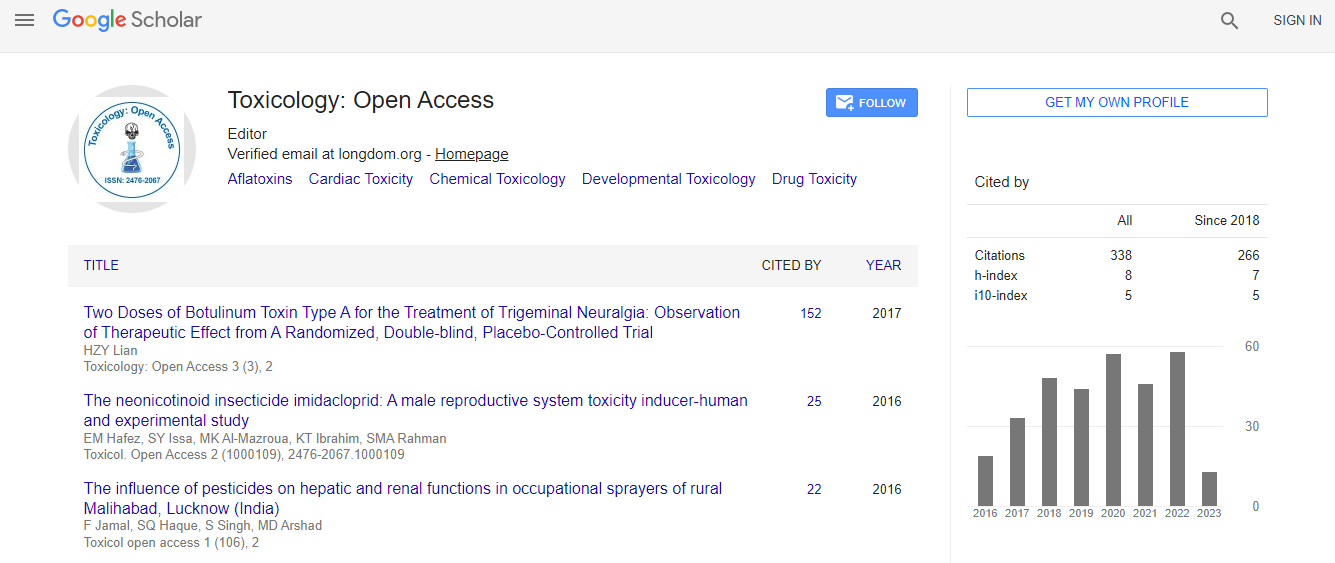Our Group organises 3000+ Global Conferenceseries Events every year across USA, Europe & Asia with support from 1000 more scientific Societies and Publishes 700+ Open Access Journals which contains over 50000 eminent personalities, reputed scientists as editorial board members.
Open Access Journals gaining more Readers and Citations
700 Journals and 15,000,000 Readers Each Journal is getting 25,000+ Readers
Google Scholar citation report
Citations : 336
Toxicology: Open Access received 336 citations as per Google Scholar report
Indexed In
- Google Scholar
- RefSeek
- Hamdard University
- EBSCO A-Z
- Geneva Foundation for Medical Education and Research
- Euro Pub
- ICMJE
Useful Links
Related Subjects
Share This Page
Administration of vitamin E increases BDNF and NGF in chronic stress induced rats
14th World Congress on Toxicology and Pharmacology
Ozair Hassan, Sangeetha, Kumaresan and Sankaran
Saveetha Medical College and Hospital, India
ScientificTracks Abstracts: Toxicol Open Access
Abstract
Long-term elevation of glucocorticoids hinders immune function, increasing the susceptibility to disease and neurodegeneration. This study evaluated the hypothesized neuroprotective effect of antioxidant and piracetam, in chronic restraint stress induced rats. Healthy Wistar rats were divided into 4 groups (n=6) each. Group-I was kept control. Stress group received chronic restraint stress for 6 hours per day for 21 days (Group-II). Group-III was administered vitamin E (40 mg/kg) and group-IV was administered piracetam (336 mg/kg). Evaluation parameters were measurement of serum brain derived neurotrophic factor (BDNF) and serum nerve growth factor (NGF). The oxidative stress markers, SOD, CAT, glutathione peroxidase, glutathione reductase and malondialdehyde were measured. Serum nitric oxide levels were also measured. Histological analysis of CA1 region of hippocampus was done to evaluate the structural changes of pyramidal neurons. Spontaneous alteration behavior was analyzed using Y maze. The results revealed that vitamin E caused statistically significant (p<0.001) increase in serum BDNF and NGF and caused statistically significant (p<0.05) increase in antioxidant enzymes (catalase, super oxide dismutase, glutathione peroxidase, glutathione reductase), with significant (P<0.001) decrease in malondialdehyde concentrations. Vitamin E caused increase in neuronal cell size and volume in CA1 pyramidal layer of hippocampus and showed statistically significant (p<0.001) increase in spontaneous alteration behavior in Y maze. The findings of study are suggestive of neuroprotection, offered by administration of vitamin E compared to piracetam against chronic restraint stress induced rats. In conclusion naturally available dietary vitamin might serve as an adjuvant therapy in order to avoid progression of brain damage during stress.Biography
Ozair Hassan is currently pursuing his MBBS from Saveetha Medical College, SIMATS. His area of research is in the field of neuroscience, under the mentorship of Dr. Sankaran P, Department of Anatomy, SIMATS in India.
Email:theonlyozair@gmail.com

 Spanish
Spanish  Chinese
Chinese  Russian
Russian  German
German  French
French  Japanese
Japanese  Portuguese
Portuguese  Hindi
Hindi 